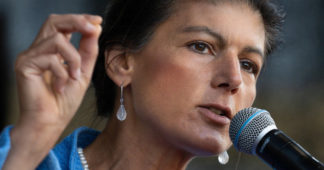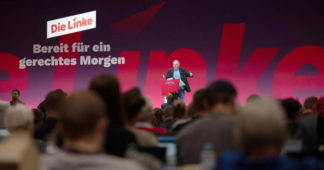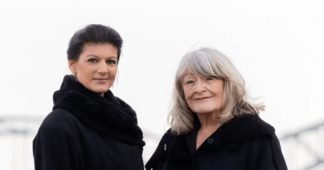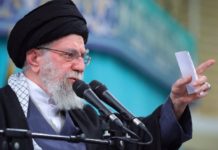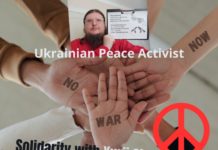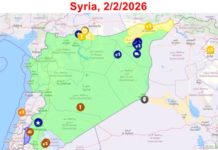Prevent war and the destruction of the welfare state!
For a consistent peace policy and against social war!
Declaration of the Berlin “What to do!?” group
We “What to do – Berlin?!” are part of the nationwide socialist network “What to do!?”. “What to do!?” emerged from a clash within the Left Party. The majority of us have left Die Linke (the Left Party), some of us nationwide are still in it and many of us are active today as members or supporters of the BSW (‘Sahra Wagenknecht Alliance’). In the Left Party we fought in particular against the softening of the anti-war position and against its orientation towards green milieus, against aspiring to be just a better green party.
In terms of peace policy, the Left Party is still in the process of becoming compatible with NATO. The Left remains torn by contradictions. It cannot be a NATO-light party and at the same time define itself as socialist. The group “What to do – Berlin?!” sees itself as a hinge between the many leftists who have left the Left Party but have not yet found their way organizationally to the BSW. For us, the debate about socialist perspectives is still important. We remain convinced that an anti-capitalist perspective is necessary in the long term. Even if peace and the preservation of the welfare state as an expression of the achievements of working people are at the center of the struggle today. We acknowledge that the Left Party has contributed to the discrediting of the terms “socialism” and “left”, so that both terms have become meaningless for large sections of dependent workers and those living in precarious income situations. Today it is about creating a party that proves its usefulness for the popular classes in the current struggles. Accompanying their struggles and initiating them where it can.
In the final declaration of the Frankfurt conference of “What to do?!” our self-image as “What to do” is formulated as follows:
“The world is in turmoil. The unchecked spiral of war is bringing death and suffering to more and more people. The wars in Ukraine, the Middle East and other regions of the world are linked to a geopolitical confrontation. The USA fears the loss of global dominance due to the economic rise of the Global South with China and is fuelling military conflicts. Even a third world war with nuclear weapons is possible. The German government is subordinating itself to this US policy. It supplies weapons to war zones. Foreign deployments of the Bundeswehr are increasing. Government policy is militarising society. Democracy and freedom of opinion are under threat. The establishment of Cancel Culture restricts the fundamental right to free speech. ….
What is needed is a social counterforce for peace. A force that places the political emancipation and social participation of people at the centre of action. This is the only way to put the social interests of the majority of the population at the center and thus make environmental protection, democracy and human rights possible. This is the only way to push back right-wing populist and right-wing extremist parties like the AfD…..
The Left Party has increasingly distanced itself from such a course – being the party of the common interests of the working population. Class politics has been supplanted by identity and clientele politics for urban milieus as well as an unprincipled push into bourgeois government positions. Positions of the Erfurt Programme were abandoned. As a result, thousands of members left the party or retreated into passivity.
Hundreds of thousands of former voters are staying away from the ballot box or voting for other parties. A majority of wage earners now perceive DIE LINKE as the left-liberal wing of ruling politics that has become alienated from the majority of the population. This course was further tightened at the Augsburg party conference… The most recent Halle party conference of the Left Party did not fundamentally change this either. With Jan van Aken as party chairman, the Left Party has appointed another warmonger and supporter of anti-Russian politics as chairman, who babbles about the victory of Ukraine and calls for the seizure of Russian ships in the Baltic Sea, as well as the tightening of economic sanctions against Russia.
The formation of the ‘Sahra Wagenknecht Alliance’ has shaken up the political landscape. Social and peace policy positions are being strengthened. This weakens the AfD and the other militaristic parties. The BSW is using popular slogans to ensure that welfare state regulations are better defended and that peace and international cooperation, freedom of opinion and democracy are promoted. Many of us will get involved in the new party or form support initiatives….
We want this party to be successful. It is an opportunity for social left politics in Germany. It will also be important to connect with the existing extra-parliamentary and union struggles.”
At its most recent Bonn party conference on January 12, the BSW once again sharpened its peace policy position. Sevim Dagdelen’s demand “Ami Go home!” is evidence of this peace policy intensification. Get rid of nuclear weapons from Germany. Away with the US military bases.
By demanding an end to economic sanctions and the reopening of oil and gas supplies from Russia, the BSW is showing the path that must be taken against the deindustrialization of this country.
As the Berlin section of What to do, we want to emphasize the urgent need for a regulated immigration policy. The welfare state can hardly do justice to its core tasks due to increasing pressure on the pension systems.
The migration policy of the established parties has failed miserably. More legal certainty is needed for all citizens and those affected. Waves of refugees are currently being caused by a belligerent foreign policy with more and more arms exports and an exploitative international trade system.
Insufficient efforts are being made to eliminate the economic backwardness of migrant communities and thus to strengthen the social and cultural cohesion in Germany.
Poverty and underemployment, exacerbated by crime and increasing cultural and religious segregation, are undermining internal security and trust in state structures. Integration, social justice and faster integration into the labor market must be promoted.
After the federal election, the admission of members is to be accelerated, announced Oskar Lafontaine and others at the party conference. We support this.
Overall, however, more space needs to be given to debates at BSW party conferences. At this conference, too, there was too little space for debate, and what was heard were prepared speeches. The BSW must give more voice to the grassroots, as in France, where there is a strong culture of debate in Melenchon’s France Insoumise.
As far as the BSW election programme adopted at the Bonn party conference is concerned, in addition to classic social democratic (in the positive sense) set pieces and a sensible peace policy, the programme also offers many different proposals for improvement with a certain technocratic twist. The programme calls for more government but fewer bureaucratic rules at the same time. It speaks of a fundamental mistrust of the prevailing state structures. Interesting are the far-reaching democratisation proposals, which are intended to enable the population to exert greater direct influence on political processes. The programme is also based on the logic that entire economic sectors that have to do with the provision of services of general interest for the people must be removed from the profit logic. The energy sector, health, education must not be subject to the profit logic and energy belongs in public hands. It is clear that the election manifesto was drawn up in great haste and has not yet been able to be discussed in detail. Nevertheless, it fulfills its main function in this election campaign with a clear peace line and a clear stance against social war.
“What to do – Berlin?!” is calling on people to vote for the BSW in the upcoming Bundestag elections, despite the one or other critical comment on the adopted election programme. There is a great deal at stake in the forthcoming Bundestag elections: war and peace, the preservation of the welfare state. The CDU and FDP want to escalate the war and dismantle the welfare state. Their model is an authoritarian capitalism and the right-wingers from Argentina’s Millei to Trump/Musk give them ideological support. The FDP is calling for more Millei and Musk. The SPD and the Greens want a more moderate dismantling of the welfare state and the Greens above all want a redistribution of the shrunken social budgets in favor of the urban middle classes. The SPD is opting for negotiations, but wants to make Germany ready for war in the major war with Russia that is predicted in a few years’ time. Whoever votes for Scholz may end up with Pistorius and Rheinmetall-Gabriel and that is also the road to war.
The Left Party is vacillating between arms deliveries and no missile deployment. It is advocating for tightening sanctions against Russia. Its top candidate for Europe, Rackete, is fueling the war against Russia from the European Parliament and the new party leader of the Left Party, Jan van Aken, is giving an interview on Deutschlandfunk, where he calls for the victory of Ukraine and the seizure of Russian tankers in the Baltic Sea. According to international law, this would be an act of war. The Left Party also has no clear stance on an unconditional ceasefire that would end the killing and is not calling for the lifting of sanctions. Its Halle party conference was a step towards NATO.
We at “What to do” are therefore calling for the election of the BSW and are doing so with our own emphases. We want to actively participate in the election campaign. An election campaign in which the differences to the established parties and the AFD, but also to the Left Party, should become clear.
We will not be able to prevent the war course and the social war only from the parliaments. We want the BSW party to be successful in Berlin too
We remind our readers that publication of articles on our site does not mean that we agree with what is written. Our policy is to publish anything which we consider of interest, so as to assist our readers in forming their opinions. Sometimes we even publish articles with which we totally disagree, since we believe it is important for our readers to be informed on as wide a spectrum of views as possible.
